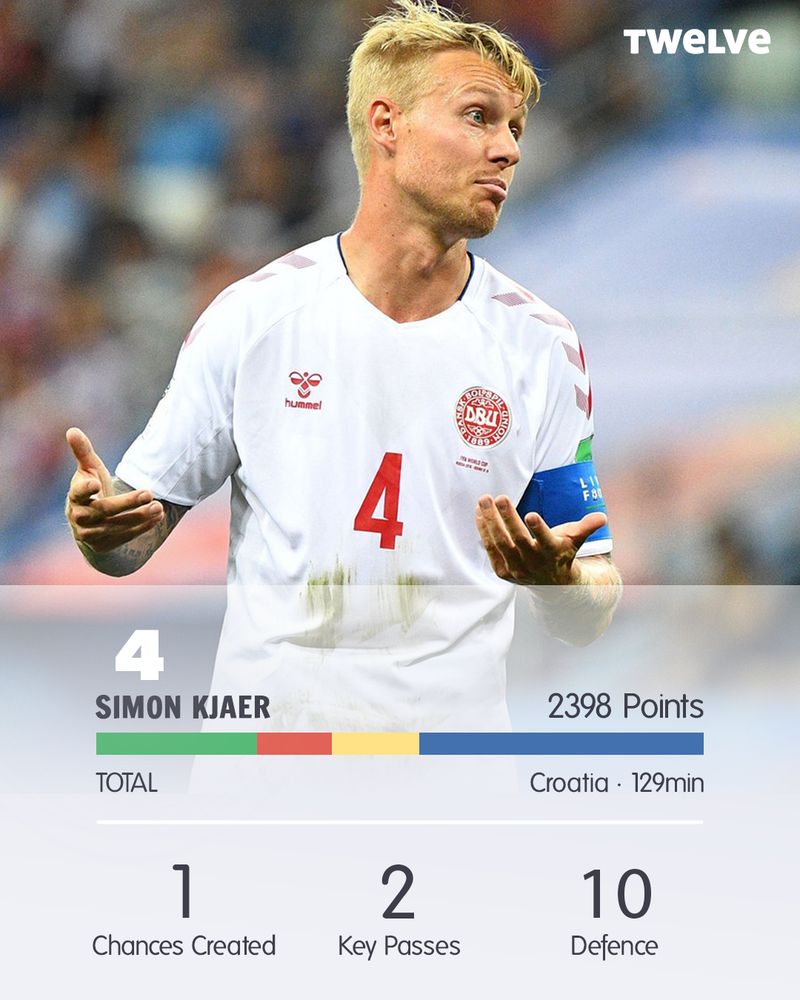
In a match which finished 1-1 and had plenty of drama, Croatia held off both it's nerve and Denmark 3-2 in penalty kicks with the veteran shot-stopper Danijel Subasic stepping up at the right time. After Russia's goalkeeper made two big penalty saves to help the hosts shock Spain in the round of 16, Croatia's goalkeeper put on his own world-class display, saving three penalty kicks to guide Croatia past the Scandinavians.
The second-smallest nation left in the competition squandered a chance to win the match with 116 played after Kasper Schmeichel superbly kept out Luka Modric's penalty and saved two more later in the shootout. Croatia will now return to the quarterfinals for just the second time in history, and the first time since the 1998 tournament in France.
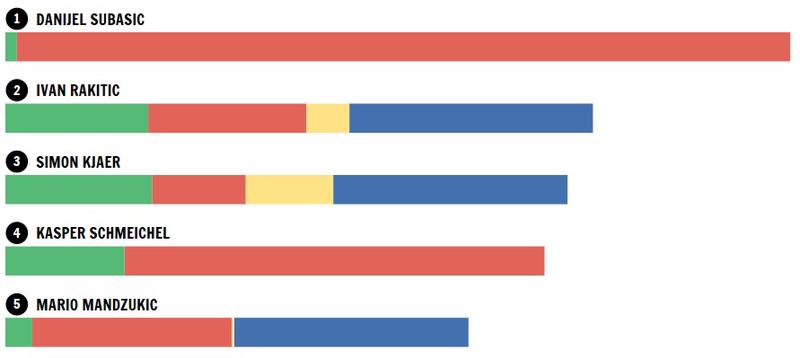
After having sat through two hours of watching Spain moving the ball around and failing to break Russia down, we were then made to endure the dullness of Croatia and Denmark's chess-like match in Nizhny Novgorod.
It couldn't have started better though. We saw two goals in the introductory part of the match with Zanka firing Denmark in front after just a minute, only for Mario Mandžukić to restore parity just three minutes later in a breathless start to proceedings.
Enjoyment of the football was not present until the very end. There was penalty shoot-out drama and penalty drama before the shoot-out. Croatia was given a penalty kick after Ante Rebic was taken down with a wide open goal in front of him, thanks to Modric putting him into that situation with a marvellous through ball. Jørgensen brought him down from behind and then his goalkeeper Schmeichel Jr. came to the rescue.
In the shootout, each side saved the first attempt before converting their next two shots. Subasic then made two consecutive stops that gave Croatia the chance to seal it. Ivan Rakitic stepped up to send his team through to the quarterfinals and somehow overcame the evil spirits who provoked him since Euro 2008 and Croatia's elimination by Turkey.
Goalies are in fashion and history repeats itself
Let's clear things up – penalties are not a lottery. There is an art to saving those and Kasper Schmeichel and Danijel Subasic showed us exactly that last night. Before we even got to the final shootout, we had a penalty in regular time. Schmeichel denied Modric and prolonged the drama in Nizhny Novgorod, after saving Denmark with just five minutes left in extra-time.
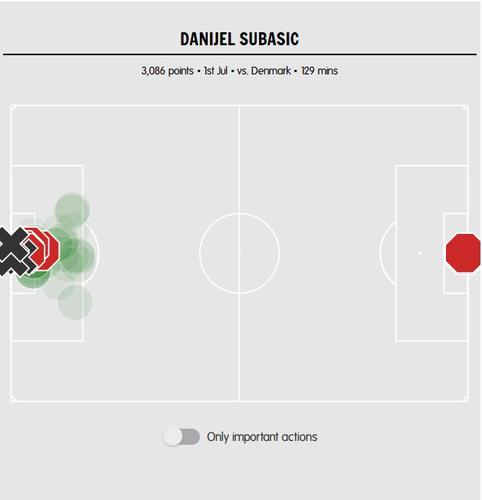
As if that was not enough drama for everyone, the penalty saves continued in the shoot-out. Whenever Subasic would pull off a save, Schmeichel would answer back. In the end, both of them saved three penalties in the game, although Monaco's veteran keeper's proved to be more significant.
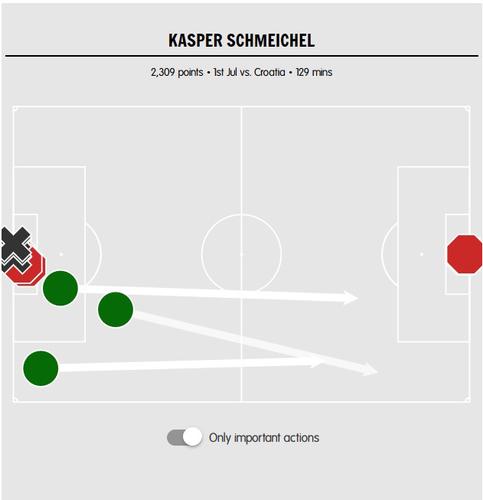
Subasic rounded up a special night by making it into the history of the World Cup, as one of only two goalkeepers who have saved three penalties in a WC shoot-out. The first was Portuguese keeper Ricardo, who denied England in Germany in 2006. To complete the whole thriller – that happened exactly on the same day 12 years earlier. You know what they say - some things are destined to be.
Croatia far from their best
I keep mentioning it: Denmark was a far tougher task for Croatia than, for example, France as an opponent in the round of 16. That was proved right last night, even though Croatia dominated for about 15 minutes following their equaliser. As the game wore on, Denmark looked increasingly comfortable both with-and-without the ball as they were coming closer and closer to scoring again. Croatia's problem was, as I suggested in my preview, shutting down the 193 cm tall Dane, Yussuf Poulsen.
The RB Leipzig star won nine aerial duels in total, and eight were in Croatia's half of the pitch. It's a pure rarity and I can't recall seeing something like that. But that's not the end to his story. The great Dane won three aerial duels in nine minutes (from 30 – 39). You can't even boil an egg in that period of time.
Not only did he show his amazing presence in the air, but Poulsen also completed the most successful dribbles among his team-mates (six) and, again, five were in the Croatian half of the pitch.
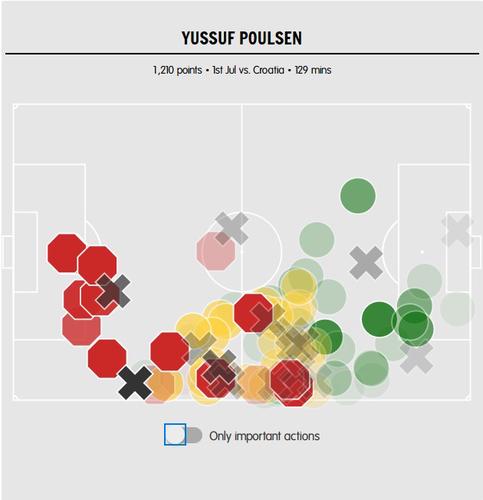
Still, Strinic panned out in that battle with huge help from Vida and Brozovic, and also Perisic when he was tracking back towards the defence.
What Croatia lacked – again – was better positioning of their own full-backs in the build-up phase. Both Strinic and Vrsaljko stood too deep with Lovren also not using the wide open space in front of him. However, I think this problem was caused by the mental attributes of Croatian players, rather than via Dalic's gameplan. It was obvious that Croatia choked under the pressure of being favourites in the clash with Denmark, while the Danes enjoyed being the underdog, as always.
<blockquote class="twitter-tweet" data-lang="en"><p lang="und" dir="ltr">Sve je vodilo prema tome da će Hrvatska ponovno puknuti pod pritiskom a onda se pojavilo malo sreće i Danijel Subašić. <br>Hrvatska danas nije izgledala dobro, posebno fizičke što je možda rezultat pritiska nego samog umora. Neki problemi su ostali ali za to očito nikog nije briga. <a href="https://t.co/kdFL22L8n9">pic.twitter.com/kdFL22L8n9</a></p>— Dino Grgić (@GrgicDino) <a href="https://twitter.com/GrgicDino/status/1013541770133692416?ref_src=twsrc%5Etfw">July 1, 2018</a></blockquote><script async src="https://platform.twitter.com/widgets.js" charset="utf-8"></script>
At the time when Schmeichel saved Modric's first penalty, Denmark won the psychological battle on the pitch and was utterly favourite to win the shootout, but the football gods were not on their side last night.
Where was Eriksen?
Usually, when you watch Denmark play you watch Christian Eriksen play. The Republic of Ireland found out how devastating the Tottenham Hotspur playmaker can be in the playoffs for World Cup but against Croatia he went missing, and Denmark suffered with the delivery of their end product as a result.
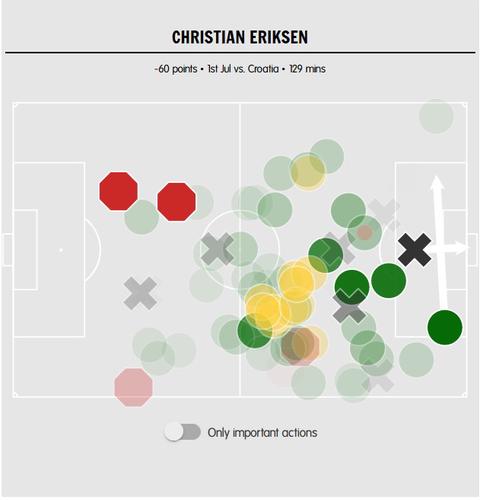
It was not maybe due to the brilliance of Rakitic & Modric duo in midfield but rather because of choosing Andres Christensen to play alongside Eriksen. The Chelsea stopper is not comfortable playing in that position or role, so he didn't know how to read spaces in front of him. This meant Denmark couldn't get the best of Eriksen.
Age Hareide detected that very well and introduced Lasse Schone in the second half. In combination with using wingers and full-backs to pin the Croatian wide-men in their own half, this resulted in a more fluid Denmark who dominated Croatia in the closing minutes of regular time.
It's a 'now or never' situation for Croatia
Croatia were lethal in topping Group D, taking a maximum nine points from Argentina, Nigeria and Iceland. The path to the final is now clear: Croatia, Russia, Sweden, Switzerland, Colombia and England. Those are the nations who can play in the final and Vatreni are the main candidates for it.
With Spain and Germany out very early, only England are a former World Cup winner in that half of the draw.
<blockquote class="twitter-tweet" data-lang="en"><p lang="en" dir="ltr"><a href="https://twitter.com/hashtag/Cro?src=hash&ref_src=twsrc%5Etfw">#Cro</a> with good chances to win the whole thing now despite being on the brink of being eliminated. <a href="https://twitter.com/hashtag/WorldCup?src=hash&ref_src=twsrc%5Etfw">#WorldCup</a> <a href="https://t.co/rl99qaCfDk">pic.twitter.com/rl99qaCfDk</a></p>— Goalimpact (@Goalimpact) <a href="https://twitter.com/Goalimpact/status/1013530315283947525?ref_src=twsrc%5Etfw">July 1, 2018</a></blockquote><script async src="https://platform.twitter.com/widgets.js" charset="utf-8"></script>
As per Goalimpact data, Croatia has a 52% chance of reaching the semis, 30.8% for one step more and 15.4% chance to win it. Only France has the better chance – 16.5%.
To sum it up, Vatreni weren't good nor near to their best but they won. Zlatko Dalic's side finally overcame the superstition which followed them after Turkey in Euro 2008 and their late elimination by Portugal in France 2016. Modric and co. showed class in the moments where they were closer to packing themselves for a trip home, and this psychological injection of confidence can be significant for the rest of the tournament.
Comments